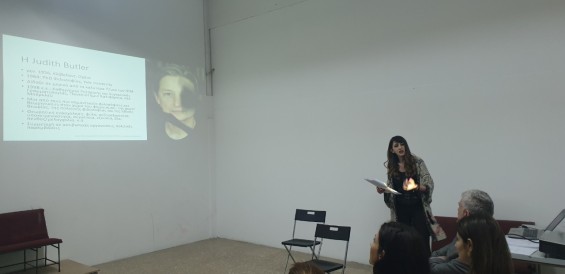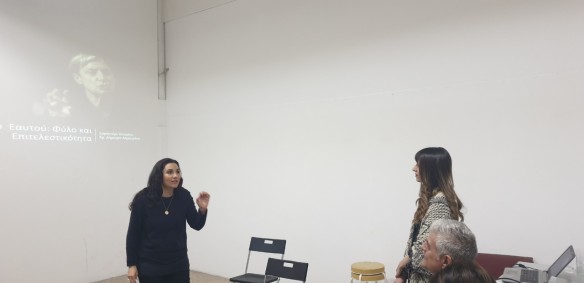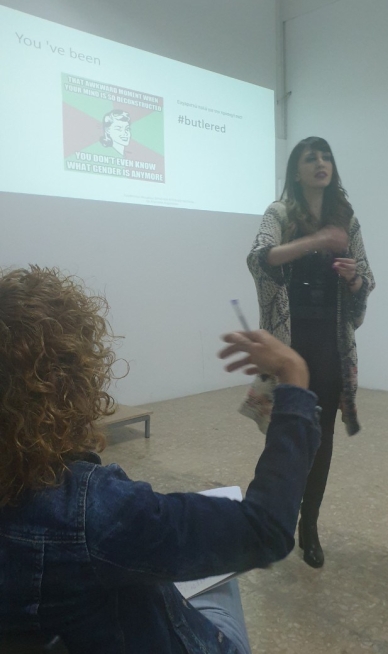A theory workshop of mine on gender performativity, focusing on the work of Judith Butler, as part of an amazing project, mobilizing a vast array of actors, directors, writers, playwrights, artists, research centres and academics: SEASON WOMEN 2019-2021, co-organized by the Cyprus-based theatre companies OPEN ARTS and FANTASTICO THEATRO.

Abstract: The work by eminent American philosopher Judith Butler Gender Trouble: Feminism and the Subversion of Identity brought about a revolution in the field of gender studies and contemporary philosophy in general. The idea that biological sex is just as construable as (indeed accessible only through) gender, furthermore, the position that identity and the body are mutually constructed through a repetitive performance of normative acts have shaken the foundations of metaphysics with regard to identity and allowed us to see the Self in the light of a contingent, dramatized, and ultimately theatrical production of meaning. Yet, if gender is a role that I “perform,” how free am I to choose my character? Which costumes are available to me? Who builds the set? What are the limits between the actor and the mask, the psychic and the physical body, the performance and the “truth”? Could the script be played out differently? How playful is the performance after all, what are the dynamics—and what is the price—of subversion? This workshop offers an introductory approach to the key concepts of Gender Trouble and co-examines criticisms of Butler’s work, evaluating its contribution to current debates related to subjectivity, sexuality, agency, politics, and ethics.





With two of the brilliant organizers of the Season, actress Nedie Antoniades and theatre director Athena Kasiou

For more information on the platform, visit the organizers’ page:
The performances and sidebar events that will be part of this platform may contain:
- the promotion of different or revised role models and archetypes for women in society
- the deconstruction of the dominant narrative or the promotion of an additional or alternative narrative concerning women
- a historical perspective on the women’s movement
- theatrical biographies of important female historical figures
- a revision of what is considered ‘classic’: a new interpretation, charged by the season’s theme, of landmark plays from the world repertory that have defined our cultural narrative (special emphasis will be given to the 19th century, the Renaissance and classical antiquity)
Sidebar events and performances of the Season include:
- new plays by women in staged readings or productions
- a platform for women playwrights in the first stages of their career
- workshops, masterclasses, readings on the season’s theme
- an emphasis of female-lead productions, especially on female directors and playwrights
From the organizers’ manifesto:
“Project SEASON is a platform and an invitation for collaboration. It consists of a series of theatrical performances and sidebar events that examine a shared theme, which is at once topical and universal and changes every two years. Long-term and short-term goals: a deeper understanding of the issue examined, artistic inspiration, the birth of collaborations and the social impact of theatre making.
SEASON Women 2019-2020 supports, promotes and gives a platform stories owned by women, to a narrative from a female perspective, to her story.
Which stories are we telling?
Whose stories are we telling?
What is classic? What is universal?
What is the dominant narrative that defines women’s role in society? How does the history of theatre in the last 2500 years reflect this narrative?
We are inspired by artists and institutions around the world who try to influence structures and challenge hierarchies, either by re-examining the policy of festivals, museums and theatres, or by creating work conatining different archetypes and role models, or by consciously choosing a different lens through which to interpret stories that defined our collective cultural identity. Writers, visual artists, playwrights, directors and actors shape the stories we tell. And the stories we tell become the world we live in.”

